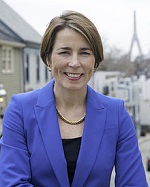The Massachusetts attorney general can complain all she wants about Gilead Sciences' ($GILD) hepatitis C pricing. But that doesn't mean a legal action against the company has a chance of getting anywhere.
 |
| Massachusetts Attorney General Maura Healey |
That's the consensus among pharma watchers after AG Maura Healey released a threatening letter to Gilead CEO John Martin. As FiercePharma reported on Wednesday, the state thinks Gilead's hep C superstars Sovaldi and Harvoni are way overpriced at $84,000 and $94,500, and says it's looking into suing under unfair trade practices law.
But a Pennsylvania health fund had zero success at advancing a similar argument in California. The Southeastern Pennsylvania Transportation Authority (SEPTA) sued Gilead last year, claiming that the company's pricing strategy was beyond the pale.
The would-be class action suit contended that Gilead's patent protection--and the monopoly it affords--shouldn't be enough to justify a $84,000 price per treatment course. The company's "limited rights as a patent holder do not translate into a license to price-gouge consumers," the lawsuit stated, citing U.S. antitrust law. As of the suit's filing in December 2014, SEPTA had spent $2.4 million on Sovaldi for its employees.
But Judge Stewart Dalzell tossed out the suit on summary judgment at Gilead's request. Last May, Dalzell said federal patent law prevails, and worries about "price gouging" would have to be addressed by Congress.
"To the extent that plaintiffs seek to use state law to challenge Gilead's exercise of its exclusive patent rights to make pricing decisions, plaintiffs' claims are preempted," Dalzell wrote in his opinion. "Federal patent law contemplates the tradeoffs between exclusivity and access, and plaintiffs cannot use state law to adjust that balance by forcing Gilead to lower its prices or disgorge profits from the sale of its patented drugs."
 Dalzell also points out that the District of Columbia tried to pass a Prescription Drug Excessive Pricing Act in 2005, but a federal circuit court nixed the idea. The "underlying determination about the proper balance between innovators' profit and consumer access to medication … is exclusively one for Congress to make," the court said, quoted by Dalzell in his opinion.
Dalzell also points out that the District of Columbia tried to pass a Prescription Drug Excessive Pricing Act in 2005, but a federal circuit court nixed the idea. The "underlying determination about the proper balance between innovators' profit and consumer access to medication … is exclusively one for Congress to make," the court said, quoted by Dalzell in his opinion.
The question is why Healey would advance the argument in the first place. As Derek Lowe points out at In the Pipeline, Gilead's lawyers are well aware of the federal-vs.-state argument and how it applies. Perhaps it's more for the court of public opinion, which is already raging against rising drug prices.
The Gilead drugs quickly soared to blockbuster levels, with $8.5 billion in sales for the first three quarters of 2014, their first on the market. The same period in 2015, the hep C franchise delivered almost $6 billion more than that--$14.2 billion. The launch broke all previous records.
There's good reason for that: Sovaldi boasts cure rates of 90% or more for some patients, when combined with other hep C fighters. And Sovaldi-based treatment is much easier to tolerate than older drug cocktails that include interferon.
But competition in the form of AbbVie's ($ABBV) Viekira Pak has already cut into prices--at least, payers' actual costs after discounts and rebates. Analysts have estimated net prices of up to 40% off Sovaldi and Harvoni's list amounts.
- see the court decision here
- check out the In the Pipeline post
Special Report: Biopharma posts a chart-topping 41 new drug approvals in 2014 - Harvoni - Viekira Pak
Editor's note: This story was updated with new information on Gilead's hep C franchise sales and pricing discounts.